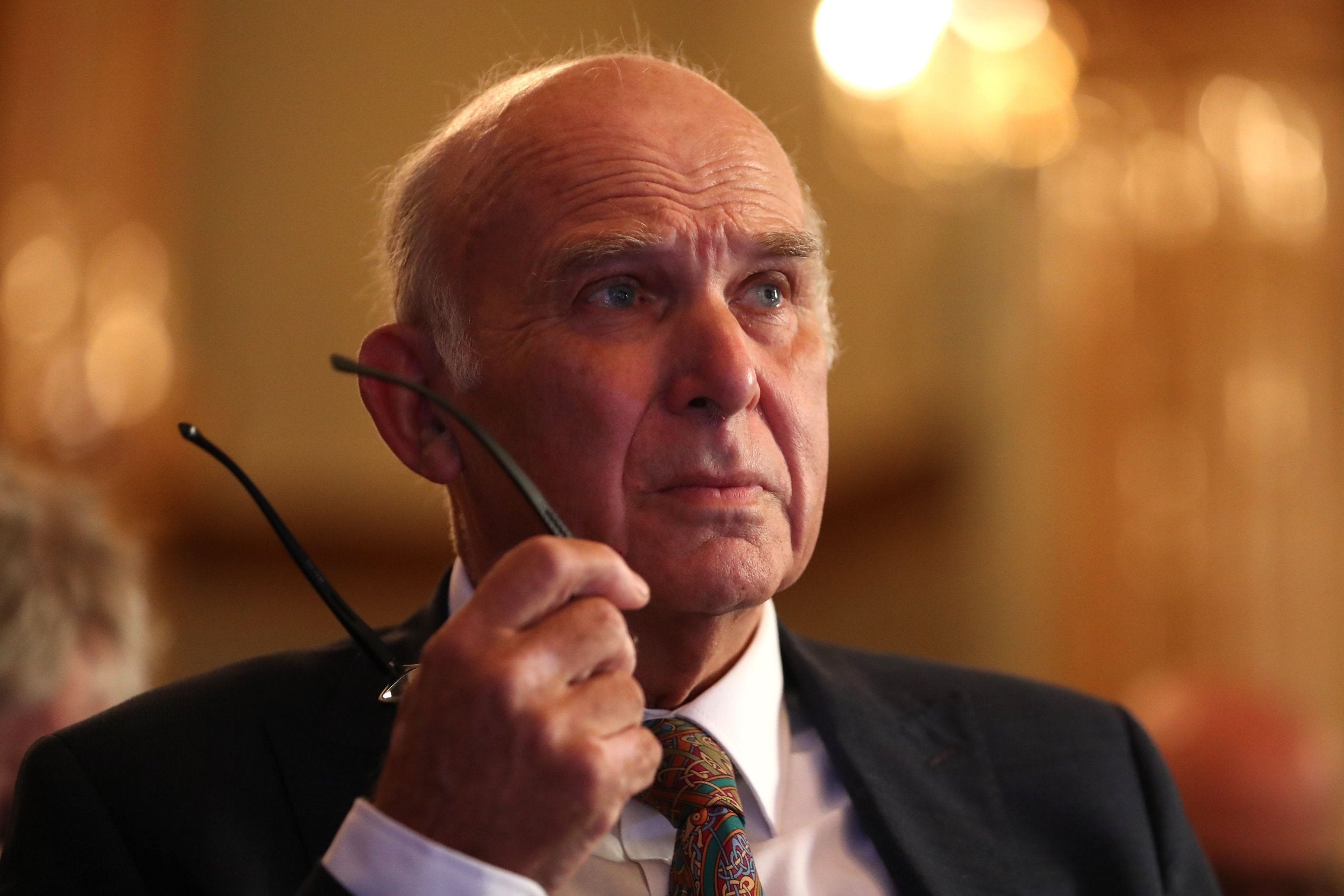Vince Cable cannot lead the new centre party – because the voters want change
The Liberal Democrats have failed to exploit the gap in the market for a moderate pro-European party, but will there be more opportunities for them after Brexit?


Your support helps us to tell the story
From reproductive rights to climate change to Big Tech, The Independent is on the ground when the story is developing. Whether it's investigating the financials of Elon Musk's pro-Trump PAC or producing our latest documentary, 'The A Word', which shines a light on the American women fighting for reproductive rights, we know how important it is to parse out the facts from the messaging.
At such a critical moment in US history, we need reporters on the ground. Your donation allows us to keep sending journalists to speak to both sides of the story.
The Independent is trusted by Americans across the entire political spectrum. And unlike many other quality news outlets, we choose not to lock Americans out of our reporting and analysis with paywalls. We believe quality journalism should be available to everyone, paid for by those who can afford it.
Your support makes all the difference.“Change vs more of the same” was the first slogan written on the whiteboard by James Carville, Bill Clinton’s campaign manager, in the war room for the 1992 presidential election.
This is the essence of opposition campaigning, and it is the reason Vince Cable has failed to fill the vacuum in the centre ground. In his speech yesterday he said the Liberal Democrats are “a centre ground pro-European, liberal and social democratic party”, and you might have thought there is a gap in the market for such a thing.
That was the gist of Tony Blair’s message this week: “I don’t think the British people will tolerate a situation where, for example, the choice at the next election is Boris Johnson versus Jeremy Corbyn.” He said: “Something will fill that vacuum.”
I am not convinced about that, partly because I don’t think Johnson will be Conservative leader. But if something did fill that vacuum it wouldn’t be the Lib Dems and it certainly wouldn’t be the Lib Dems led by Cable.
The gap in the market is not for some bloodless positioning between two policy extremes – it is for change. The reason Emmanuel Macron and Justin Trudeau succeeded was that they offered to make things better – being telegenic pragmatists was important but secondary. The hunger for change is why the Brexit vote was won, and why Corbyn did so much better than expected in the election last year.
And the reason Theresa May lost her 20 point lead in the opinion polls was that she started the campaign as the change candidate who was going to deliver Brexit (and a better life for the “just about managing”), but ended it as the “more of the same” candidate who was going to force old people to sell their homes.
Cable has many qualities. He is competent, utterly reasonable and predicted the 2008 crash every year since 1991. His age ought to be irrelevant: he is 75, six years older than Corbyn. But he was a cabinet minister in the coalition government. He is the “more of the same” that supporters of Brexit and of Corbyn are, in their different ways, trying to get away from.
To his credit, he realises it. That was the purpose of this week’s speech. He said he would stand down from the leadership after Brexit is “resolved”, but that meanwhile he wants to put in place changes that would make the party better placed to take advantage of any hunger for change that grows in the next few years.
It is likely that it will, even if its nature cannot be predicted, by Cable or by Blair. Once Britain leaves the EU it will probably become clear that our departure hasn’t satisfied many of those who voted for it. And it is possible – Cable and Blair must certainly believe so – that Corbyn’s promise of socialist nirvana will look tarnished by years of Labour civil war by the time of the next election.
Hence Cable’s attempt to rebrand the Lib Dems as a “movement for moderates”; to open the party up to supporters who can sign up free; and to open the leadership, elected by such supporters, to anyone, including those who aren’t MPs. This is a profound insult to Jo Swinson, his deputy leader, and to Layla Moran, the new MP who would also be a contender. But it makes sense to make extra-parliamentary leadership possible in case a charismatic person emerges, in the way that Macron did in France, without a party to support them.
Interestingly enough, the social media appeal for Lib Dem supporters begins: “It’s time for change.” At this stage it sounds like an empty slogan, and the next line, “It’s time to stand up to power and privilege to restore fairness and opportunity in Britain”, sounds like milk-and-water Corbynism. But a desire for change is what the Lib Dems have to position themselves for after Brexit, either on their own or in partnership with independent Labour MPs and new parties.
It is often said that leaders undermine their achievements by choosing or failing to prevent an unworthy successor. Blair allowed Gordon Brown. Brown covertly backed Ed Miliband. Miliband changed the rules to allow Corbyn. On the Tory side, William Hague changed the rules to protect himself from Michael Portillo and gave the party Iain Duncan Smith as leader. Michael Howard, on the other hand, stayed on to give David Davis time to fail and David Cameron the chance to shine.
In his speech this week, Vince Cable in effect admitted that he has failed as Lib Dem leader, but he may be remembered as the one who gave the party the chance to succeed.
Join our commenting forum
Join thought-provoking conversations, follow other Independent readers and see their replies
Comments